Processing Your Payment
Please do not leave this page until complete. This can take a few moments.
The entrepreneurs of Brunswick's TechPlace
TechPlace, the entrepreneur incubator at Brunswick Landing, lacks the cacophony and frenetic energy of the typical Massachusetts or Silicon Valley startup space, and that's not a bad thing.
Here, many mid-career or encore entrepreneurs move steadily ahead with cutting-edge technology and the experience and connections to guide their ideas from conception through funding and onto commercialization, while still chasing their dreams.
There are 24 tenants, says TechPlace administrator Kristine Schuman. There's still one office space left and about four or five desk spaces, but she plans to expand the building with four more offices upstairs this fall as well as renovating 25,000-square-feet for six industrial spaces mid-year. Both the bio lab and manufacturing space are operational, but will open officially this spring, she says.
While Schuman says some of the occupants are in their early 20s to early 30s, many are over 50 with lots of experience and a new dream.
“There's an opportunity to help grow a small business whether you've scratched out an idea on a paper or worked out of your home for a year,” she says. “We offer support and education to run a business.”
Of TechPlace's fast growth, she says, “It's gone even faster than I thought. I wanted a dozen companies in the first couple months, but here we have 24 companies a year later.”
New tech to age guitars
Bourgeois Guitars knows a lot about chasing dreams, having gotten national recognition in 2015 when 15-year-old Sawyer Fredericks, who just weeks before mucked stalls on his family's New York farm, won TV's “The Voice” playing a Ray LaMontagne Signature Series Bourgeois guitar.
Today, Bourgeois still builds high-end acoustic guitars in an 1860s-era mill in Lewiston, but CEO John Karp travels to TechPlace several times a week to oversee one of the luthiers new lines of guitars, the Aged Tone Series that uses a torrefied top from treated Adirondack red spruce. The aged wood, he says, creates an instrument that sounds like a decades-old vintage guitar.
“The machine we bought for torrefaction didn't fit into our space in the mill, and it used too much electricity,” says Karp, who is a mechanical engineer by trade. But it fits handily into an industrial space at TechPlace. The Maine Technology Institute helped Bourgeois buy the machine with a $25,000 seed grant in 2012, which the company has matched over the years with more than $125,000, he says. Maine Venture Fund also is a major investor in the company.
The wood's thermal aging takes several days and involves steam, heat and cooling with a weight atop the wood so it doesn't warp.
“It smells like old guitar wood, has an aged tone finish and emulates the lacquer of vintage guitars,” Karp adds. “We stood the guitar industry on its head.”
Company founder Dana Bourgeois still tests the flexibility and tone of each guitar before it goes out the door. Right now, about half of Bourgeois' guitars are made using torrefaction. The company's torrefied guitars, which it has been making for about three years, and its regular wood guitars made by Dana and a dozen other luthiers in Lewiston, range in price from $4,200 to $23,000, and take anywhere from 60 hours to two months to make.
Karp adds that TechPlace affords some symbiotic relationships: a company with computerized numerical control, or CNC, machines recently moved in. Karp says Bourgeois may eventually collaborate with it to make guitar necks.
Military quality 'chic' for consumers
Framed patents line the walls of Grifin LLC, while shelves hold models of a new, quieter submarine; a prototype gun that also can cut through or weld metal; a jacket that can stop a .44 Magnum bullet point blank; and a string of stubby cylinders that can cut through supports to dismantle an oil platform or through a sinking ship's hull to rescue survivors. There's no question founder Eric Bleicken — a Vietnam War veteran and former Navy Underwater Demolition Team member — is an inventor of solutions that can be used by the military or civilians.
Like “Q” of James Bond legend, Bleicken is in his heyday dreaming up solutions to today's problems and those that may emerge in the future. With 20 issued patents and twice as many ideas in his filing cabinets, he joined TechPlace last summer to have an office, network with others and have access to machine shops and labs.
“Plus I get extraordinary access to political folks in Maine and funding sources,” says Bleicken, a University of Maine, Orono, graduate. “People are coming here to ask how they can help.”
While his aim is to invent things other people can spin off, his parent company will maintain ownership of the developments.
His first product has a military-police feel to it, but it's for consumers. At its base is a soft, flexible material made by Tex Tech Industries Inc. of North Monmouth. Bleicken says Grifin adds more materials so it ultimately is half the weight of a Kevlar vest but can be used to make a jacket or a jacket liner that can wrap around a consumer and protect the femoral artery in their thigh. It absorbs the bullet's energy and is reusable.
Bleicken still is in the design and testing phases of the jacket with two colleagues, but envisions selling it to civilians who live or work in dangerous areas or war zones for $8,000. He first needs investors so he can make samples, test them and then make a videotape to advertise their value. Then he plans to launch a crowdfunding campaign and sell the jackets directly to consumers over the Internet.
First biotech company
Stewart Hunt may be the general manager for the North American operations of Swiss biotech company InSphero, but he's come home when locating the company's U.S. tissue-culturing operation at Brunswick Landing.
Hunt, a biologist who hails from Brunswick, initially looked to lease space within existing large biotech businesses in the state, but discovered he could have an independent lab with support facilities and local talent within an easy drive to Boston, which was a big selling point to the Swiss parent.
“I sold the state of Maine to them. It's a bit off the beaten trail but still has proximity to Boston,” he says. “And we found people within weeks, including our director of manufacturing, who had worked at Pfizer.”
InSphero makes spheroid cell cultures instead of the traditional two-dimensional cell cultures, a development he calls a game-changer for drug testing. The cultures can help pharmaceutical and industry companies developing drugs derisk them more quickly by identifying potential toxic side effects faster and having more predictable results, he says.
In February the U.S. arm of the Swiss company built out its Brunswick presence so it could start taking and processing orders with North American customers. That move, Hunt says, will simplify order fulfillment for customers in the company's largest market. Buyers can now place orders directly with the U.S. company.
The Brunswick office currently has five employees, which he expects to double by next year. The company uses both its own bio lab and the shared bio lab space at TechPlace that opened recently.
“This space is like a blank canvas,” he says. “It's a world-class manufacturing site. And it's less than half the cost of other areas [like Boston].”
A sport plane you can park in your garage
Paul Richards, who has been a private pilot for more than 20 years, has more than one bag of tricks in his pocket at TechPlace, where he is CEO of Wireless Sensors, a restart of a Massachusetts Institute of Technology Artificial Intelligence Lab spinout that developed an autonomous, ad hoc wireless sensor network technology, and director of business development for a sport airplane company called MVP Aero that is still early stage.
The wireless sensor network company is based in Cambridge, Mass.; he is the only employee in Brunswick, is a native Mainer and a University of Maine graduate in engineering. The network is aimed at pharmaceutical and biotech companies as well as controlled storage environments like computer server farms for the “cloud” to keep the environmental temperature steady.
So far, that company has an MTI seed grant totaling upwards of $60,000 with a match of about $100,000. Wireless Sensors is prototyping its network components in Brunswick and outsourcing manufacturing to AMI in Winthrop. It also is using the 3D printers in the common industrial space.
“We have our own low-end 3D printers but the ones being installed here now are medium-to-high range. We couldn't justify buying them, but they're available to us here, and we have access to all the other facilities like conference rooms, printers, the machine shop and Internet,” he says.
The newest technology is at MVP Aero, a company in Minnesota in which he's invested a modest amount. That experimental plane will be built in Brunswick, with the nearby air strip a handy asset.
“It's a relatively new category — the light sport plane — certified by the Federal Aviation Administration about seven years ago,” he says. “It was to spur innovation and activity and decrease the cost of airplanes.”
The planes, he says, can cost around $200,000. He calls them recreational vehicles as opposed to transport airplanes. They operate outside the regular airspace for commercial flights.
The MVP, or most versatile plane, is being designed in Minneapolis by former engineers at Cirrus Aircraft. When completed, the plane should be able to fold up its wings to fit into a garage or a marina for storage, land on water and even serve as a camper on which you can hang a hammock to sleep.
Richards says he is helping get it to the next phase. The design is done and full-scale prototype models will be built and tested in Brunswick. After all, Richards notes, TechPlace has the former Brunswick Naval Air Station's advanced airport facilities and is near both the Androscoggin River and Casco Bay for testing. There also is local expertise in composites and boatbuilding.
Enthusiasm for the recreational plane is high. Richards says he's already sold 30 “delivery positions,” which means buyers will take the planes when they are ready, which now is targeted some time in 2019. He already has secured $100,000 in non-refundable deposits.
“I got involved because I wanted to buy one of the airplanes,” he says. “And I realized TechPlace is the perfect place to do this development.”
Telescoping partitions to protect sensitive areas
When a hospital has a sudden water leak and needs to protect patients, it can quickly erect a protective barrier using temporary telescoping partitions made by STARC (Simple Telescopic Airtight Reusable Containment) Systems.
The two-year-old company, started in partnership with owner Tim Hebert of Hebert Construction in Lewiston, now has five employees, including Hebert and COO Bruce Bickford, plus some unpaid workers and a new investor, John Wipfler, who serves as an advisor. The plan, says Bickford, is to hire another two to three people for shop assembly and sales by the end of the year.
Bickford says Hebert got the idea for the panels when his construction company faced many containment issues in the health care field. Previously, plastic sheeting or quickly placed drywall was used, or transparent walls that offered little privacy, he says.
But the telescoping modules, which can be stretched from 6 feet 10 inches to 10 feet 3 inches and have rubber or tape at their edges for total containment, can be constructed quickly and neatly, then removed when repairs are completed. The aluminum walls, which include some insulation, also help attenuate noise.
He points to several customers in the region, including Central Maine Medical Center, which used upwards of 100-feet of modules to make its emergency room safer for staff and patients. Others using the modules include Maine Medical in Portland, St. Mary's in Lewiston, Eastern Maine Medical and Southern Maine Medical.
Contractors are the typical customers that install the modules. “It takes about six to eight uses to pay back the investment,” says Bickford. The system runs about $350 per linear foot.
STARC will use some new MTI money for a forthcoming product line that Bickford says is “cheaper, better, faster and fire-rated.” The new product will supplement the current product line, and could be used as a semi-permanent wall to isolate a piece of equipment, for example, in a biotech or precision manufacturing line.
He says TechPlace has worked well for the company, which has 4,500-square-feet of space for about $3,000 per month, including heat, lights, a shop, air conditioning, furniture and even snow plowing.
He plans to collaborate with the composites group in TechPlace on the new product, which could be made of a composite instead of aluminum to make it lighter and add other qualities.
“We were one of the first industrial tenants here,” he says. “We're expecting dramatic growth, but we'll stay here until we physically outgrow the space.”
Read more
200 additional jobs headed to Brunswick Landing
Brunswick startup lauded for work in hospital construction zone
Brunswick Landing tops projected job growth
Officials look into connector to ease Brunswick Landing congestion
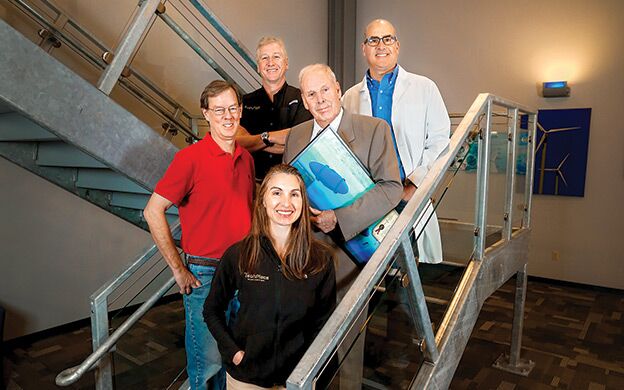
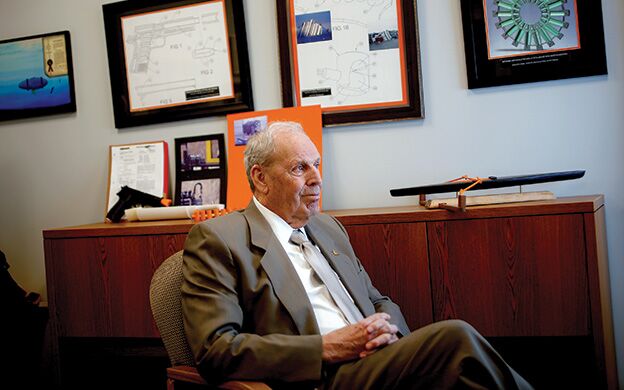
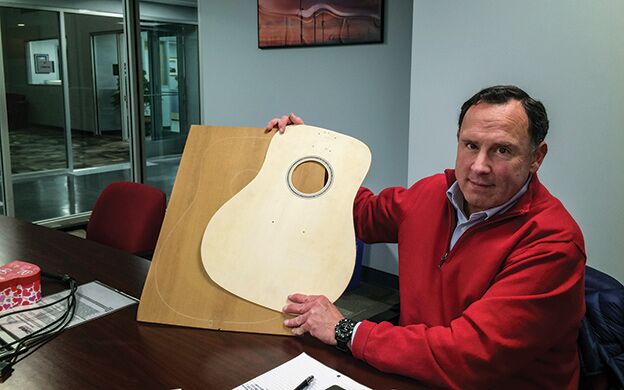
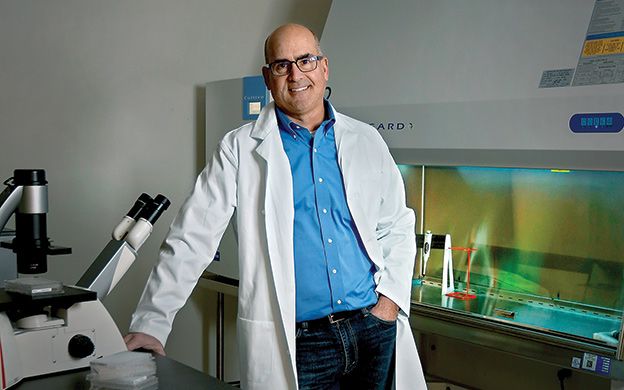
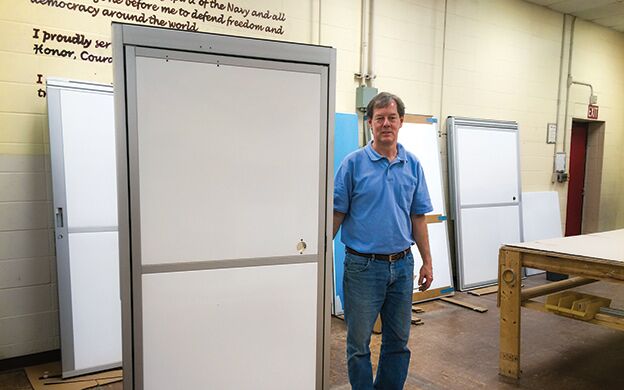
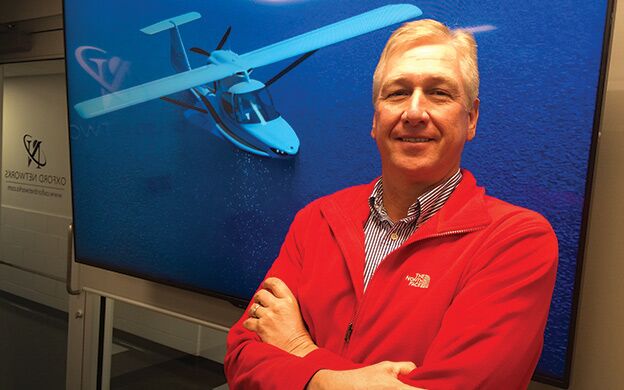









Comments